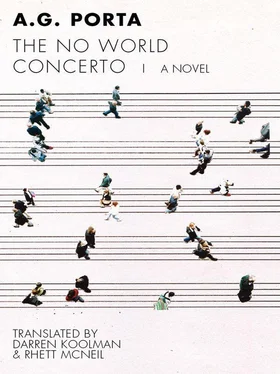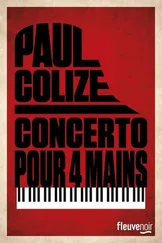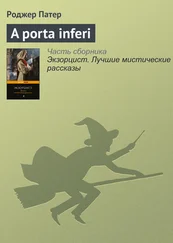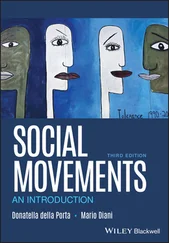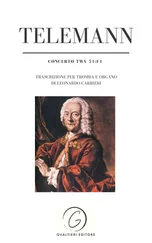Why did they cancel her performance of the 5 Pieces for piano ? She calls her mother, who advises her first to calm down, to be reasonable, and then to consider why they replaced her. She’s shown herself to be quite distracted lately, even indifferent. To be ranked among the elite in the piano world, one can’t afford to be distracted, and certainly not indifferent. Be reasonable? How can she be reasonable when her own mother, and representative, is taking the side of her adversaries? Why would she want a daughter who lacks character, who just acts the way she’s expected to act? Is this the way they want her to perform too? She does a few turns around the room, trying her best to calm down. It’s time to prove to herself she’s a writer, to accept that what’s happened isn’t important, to prove she can shut herself away and dedicate all her energies to writing. She’d like to make more progress on her story about the wistful professor in the floating City in Outer Space, but she gets distracted thinking about her father. Like the screenwriter, she has the feeling she’s repeating herself, that she keeps having the same thought patterns, as if there are no other subjects to think about. Maybe it comes from being bound in a nutshell. All she basically writes about are commonplaces, silence and solitude, reading and writing, hope and patience. Sometimes she talks to her father about writing, about her future literary work, but he always falls silent because they can never get past the same fundamental disagreement. Her father is essentially a skeptic, while she believes she can change the world, that her novel will revolutionize literature. In these instances, he remains quiet while she’s at pains to make him understand. It’s probably the voices that make her feel so sure of herself, the ones that show her the way, although her father believes it’s just youthful audacity, the arrogance of ignorance, the fruits of inexperience. Frustrated by this reminder, the girl directs her thoughts elsewhere. She looks at her father, asleep on the bed, fully clothed, as if to be ready for an event that, sooner or later, is bound to occur; a sudden and alarming event that won’t allow him even a minute’s reprieve to get dressed. The act of waiting: one of those ideas on which she leans. As is her fascination with the astrophysicist who knows her mother; her fascination with her father and his associate, the patience they demonstrate day by day, hour by hour, waiting, for whom, for what? she asks herself again as she looks over at the Grand Central Station, as if the act of looking will yield an answer. She goes to the balcony, lights a cigarette, and smokes it while she broods. Then she returns to her seat in front of the laptop. At first she has trouble getting into her zone, but finding a good opening phrase is like guessing the correct password, which then opens up a portal to her No World . “2.225 There is ultimately but one true image. A reasonable time has elapsed, perhaps a couple of weeks, since the woman received the first anonymous call. Now she’s having an argument with her husband. She tells him an anonymous caller told her all about his affair with the female student. He’s defensive at first, insists the accusation is false, that it was made by a student, perhaps one who resented a poor grade. She’s got no idea what these little brats are capable of, he says. Some may use their precocity for getting good grades; others for avenging the receipt of bad grades; but neither sort will exercise any restraint in their machinations toward achieving their goals. But when his wife shows him the photograph, the old professor has no choice but to fess up. He then gives a vain and thoughtless excuse, asking her if she’s ever looked in the mirror and lamented becoming shriveled and old when the rest of the world seems flush with youthful skin. The woman locks herself in one of the rooms. He goes to the door and stands outside. He can hear her crying. Not that this bothers him as much as the photograph, and where it came from. He knows it’s one he took himself, in which he and the female student are posing together. It’s not especially lewd, but the two of them are lying naked on a bed whose sheets are completely white, looking at the camera, with a copy of W’s magnum opus by their side. He’s worried about how it got into his wife’s hands — if it was the work of a detective who broke into his study and filched it. He approaches the door of the room in which she shut herself, asks her softly how she got the photograph — softly, to mollify her, but only in the hope of soliciting an answer. But she doesn’t answer, she only sobs. After a while, he hears her snuffle that they were sent anonymously. The woman then emerges from the room, having seemingly regained her composure, and threatens to report him to the Academy where he teaches philosophy. You’re finished! she screams energetically. They’ll fire him. They’ll put him in jail. She’s tired of all his lies. She’s tired of him. The old professor curses at her and slams the door violently. He doesn’t even think to suspect the female student, that it was she who stole the picture from his study.” The girl goes back over what she’s written, slowly moving the cursor along to follow what she reads. The old professor lacks a sense of playfulness. If something goes wrong, he should think of it as a game. Everything’s a game. Life is only a game. “Perhaps, years later, when the old professor is even older, he’ll finally understand the mantra of ‘it’s all a game,’ and even sound it repeatedly while remembering the female student and his wife, recalling the events that drove him to leave, to flee to the City in Outer Space. Alone, in a desolate floating metropolis, careening aimlessly through space, waiting for death, with nothing to do except read and reminisce, he’ll be poring over W — flipping through a musty old copy he found in a library next door to a depot he was raiding for supplies — and while sitting in that library waiting for death, flipping through the pages of a musty old book, he’ll finally understand the mantra. He won’t know what year it is on Earth, how far from it he is, whether he’s getting closer or moving farther and farther away from it. Sometimes, he’ll go to the control room, or the government building, but he won’t know what to do, where to start, so he’ll think of the movies he saw back on Earth, the ones about the future, space travel, and all the rest, not that they’ll be of any help. If he was to go back now, perhaps the girl will not have aged; perhaps he’ll even get to hear her whisper in his ear again: Life, it’s only a game.” The girl gets up and walks nervously around the room. She looks outside, nothing: just the usual ebb and flow of people through the plaza. The screenwriter’s situation now reminds her of her own, holed away in a room, writing and staring out the window. Still sitting on the café terrace, it occurs to him that the girl will not be able to suffer her seclusion much longer. She’s too young to be waiting indefinitely for something that may not materialize. She thinks life’s a game. Delight in the novelty of living like an anchorite soon enough gives way to despair. She should be practicing the piano, working on the new sound she dreams will blaze a musical trail around the globe, but she doesn’t want to practice. She wants to avoid bumping into her mother. Perhaps she needs to take a break. Perhaps too much practice will negatively affect her performance on the recording. The screenwriter thinks it’s a bad idea. Giving up practice might upset her peace of mind. Playing the piano used to relieve the stress of a busy schedule. She may not have appreciated it, but after all the classes at the Institute, the rehearsals and concerts, the arguments with her mother, the fights with the young conductor, the piano was a release for her. It’s still raining, so the screenwriter thinks about the girl as she looks out the window. The cell phone rings. The brilliant composer is calling from a radio station where they’ve just given an interview. Since you couldn’t come, you can listen, he says curtly. She hangs up without answering. Moments later, however, she goes into the bathroom, so as not to awaken her father, and tries tuning in.
Читать дальше
